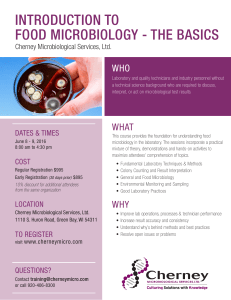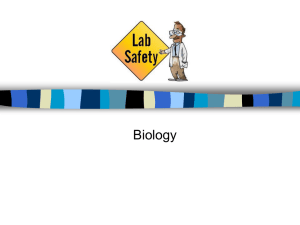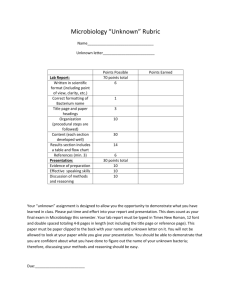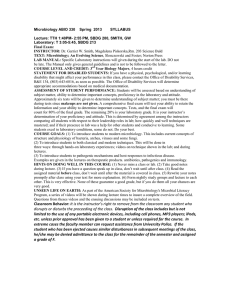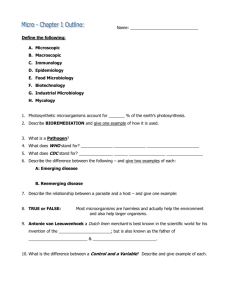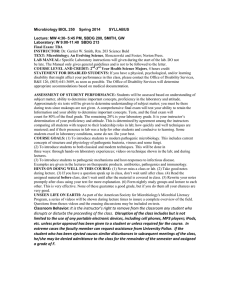Document 12656328
advertisement
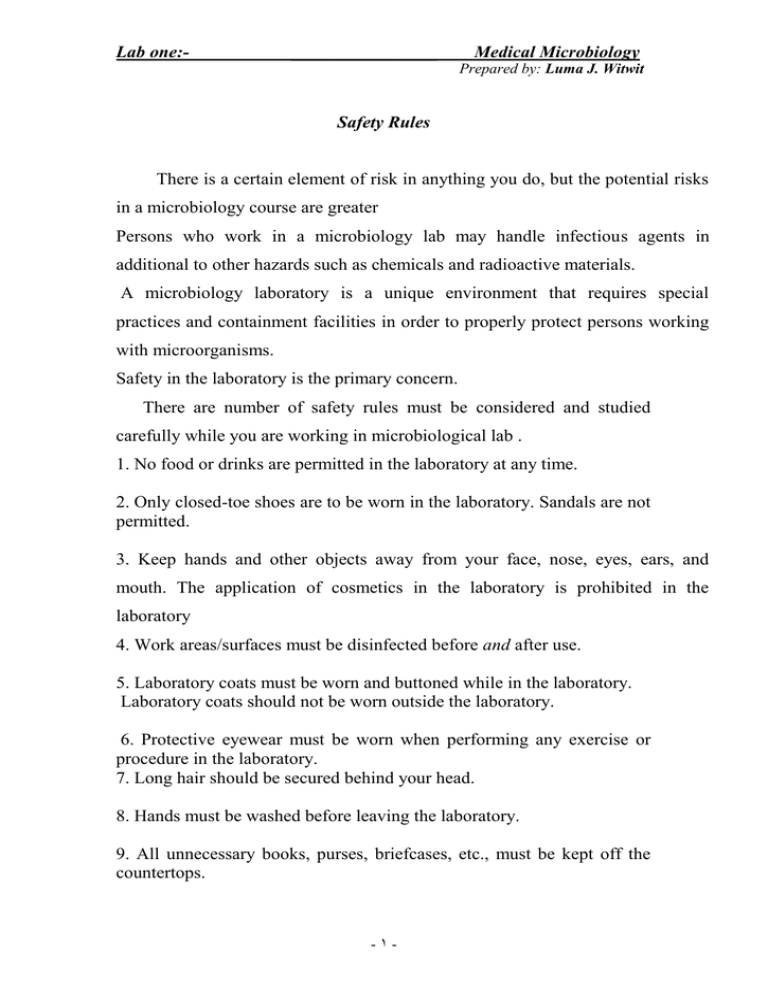
Lab one:- ________________ Medical Microbiology Prepared by: Luma J. Witwit Safety Rules There is a certain element of risk in anything you do, but the potential risks in a microbiology course are greater Persons who work in a microbiology lab may handle infectious agents in additional to other hazards such as chemicals and radioactive materials. A microbiology laboratory is a unique environment that requires special practices and containment facilities in order to properly protect persons working with microorganisms. Safety in the laboratory is the primary concern. There are number of safety rules must be considered and studied carefully while you are working in microbiological lab . 1. No food or drinks are permitted in the laboratory at any time. 2. Only closed-toe shoes are to be worn in the laboratory. Sandals are not permitted. 3. Keep hands and other objects away from your face, nose, eyes, ears, and mouth. The application of cosmetics in the laboratory is prohibited in the laboratory 4. Work areas/surfaces must be disinfected before and after use. 5. Laboratory coats must be worn and buttoned while in the laboratory. Laboratory coats should not be worn outside the laboratory. 6. Protective eyewear must be worn when performing any exercise or procedure in the laboratory. 7. Long hair should be secured behind your head. 8. Hands must be washed before leaving the laboratory. 9. All unnecessary books, purses, briefcases, etc., must be kept off the countertops. -1- Lab one:- ________________ Medical Microbiology Prepared by: Luma J. Witwit 10. Never pipette anything by mouth (including water). Always use pipetting devices. 11. Label all materials with your name, date, and any other applicable information (e.g., media, organism, etc.). 12. Dispose of wastes in their proper containers (see Biohazard Waste Disposal below). 13. When handling chemicals, note the hazard code on the bottle and take the appropriate precautions indicated. 14. Do not pour chemicals down the sink. 15. Return all chemicals, reagents, cultures, and glassware to their appropriate places. 16. Do not pour biohazardous fluids down the sink. 17. Glassware should be washed with soap and water, then rinsed with distilled water. 18. Flame transfer loops, wires, or needles before and immediately after use to transfer biological material 19. Do not walk about the laboratory with transfer loops, wires, needles, or pipettes containing infectious material 20. Be careful around Bunsen burners. Flames cannot always been seen. 21. Turn off incinerators before leaving the laboratory. 22. Report any broken equipment. 23. Immediately, report any broken glass, especially those containing infectious materials. 24. If you are injured in the laboratory, immediately contact your course instructor or TA. 25. Any chemical or biological fluid spills must be immediately reported to your course instructor or TA. 6. Follow all instructors given by your course instructor or TA for cleaning up any spills or broken glass. -2- Lab one:- ________________ Medical Microbiology Prepared by: Luma J. Witwit 27. Familiarize yourself with safety equipment in the laboratory and emergency escape routes. 28. Always wipe and clean the lenses of your microscope before putting it away. Use the appropriate tissue paper and cleaning solution for this purpose. 29. Use appropriate universal precautions with all biological fluids. 30. Do not remove any materials from the laboratory without the written permission of the course instructor or TA. Some of Important instruments of Microbiological Lab. 1- Electric oven: used for sterilizing the glassware and tools that need dry heating with (150Co ) for ( 2 hr ) approximately . 2- Autoclave : to sterile the culture media and some of chemical solutions which need wet heating with (121 Co ) and pressure (15 bar / Inch2) for suitable time . 3- Incubator : For provide the suitable temperature to grow the bacteria , most bacterial species grow under ( 37 Co ) for ( 18-48 hr ) . 4- Compound Microscope: is a vital instrument in microbiological Lab. to identification the bacteria by it is magnification ability . 5- Refrigerator: Used for storage the culture media , bacteria growth culture and other material that need low temperature . 6- Distiller : its providing sterile distilled water . -3- Lab one:- ________________ Medical Microbiology Prepared by: Luma J. Witwit 7- Hood : for availing an uncontamination environment during the laboratory work . 8- Gas Burner: used to sterile the mineral tools such as loop, needle and nozzle bottles or flasks . 9- Sensitive Balance : for weighting the powders . 10- Millipore Filter Unit : Used for sterilization of solutions by filtration especially the solutions are damage by heating sterilization . 11- Loop & Needle : platinum wires used for transporting culturing and inculcating the bacterial growth . 12- Petridish : these dishes (plates ) used as container of culture media . 13- Ultra Violate light source : to sterile the atmospheric laboratory. 14- Flask , Cylinders , Pipettes , Tubes , Slides and other glassware . 15- Washing brush : For bottle washing . -4-
